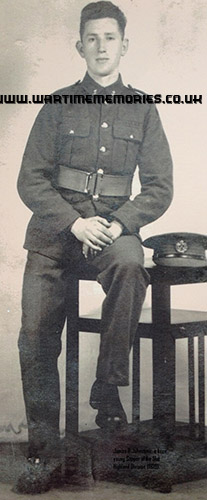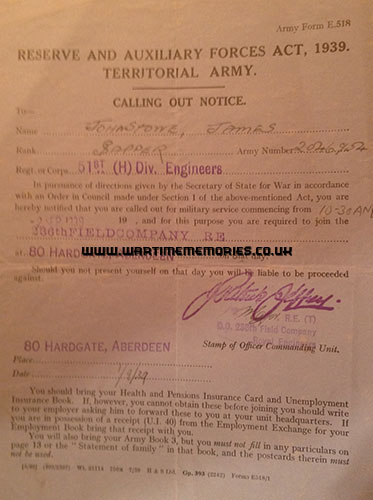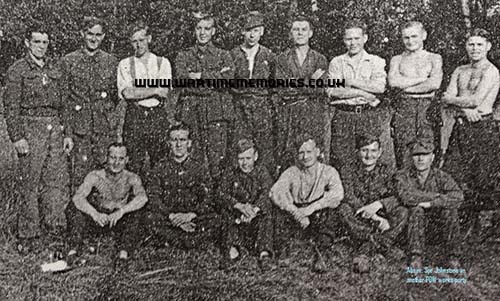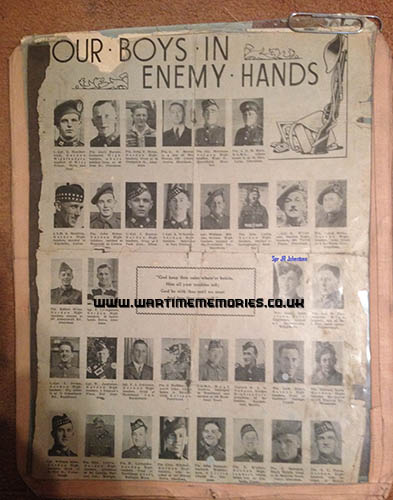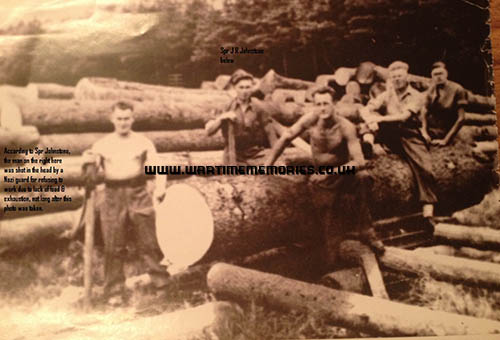Jimmy is still living and is 98 yrs old in 2019.
At sixteen years of age, James Johnstone, the son of a WWI Somme Veteran and farmer, joined 236th Field Company RE (TA) in Aberdeen on 7th of December 1937. He specialised as a Sapper Driver and continued with this unit until the break-out of WWII when he received his Call-Out Notice on 2nd of September 1939, in which he also began his Colour Service. A month later he was transferred to the 51st Highland Division and joined the British Expeditionary Force in France, January 1940.
The first action Sapper Johnstone and his unit encountered was in late May 1940 and by June they were in the heat of battle at St Valery en Caux. As a keen and green young soldier, Spr Johnstone killed four Germans in battle with a Bren Gun and all of the NCOs in his Company, bar one, were also killed. Upon receiving immediate orders to surrender, Jimmy Johnstone's response was, Am I f###!.
Of course they all had to lay down their weapons and their ammunition. St Valery was now under Rommels command.
The long journey to the POW camps began. The Nazis had beaten them with rifle butts, denied them enough food and water and shot any British soldier who could not march on. They were put on barges on the Rhine in stinking conditions then spat at by German crowds lining the streets in Hildesheim, Germany. The hellish march to the Stalag POW camps became known as the Death March.
Jimmy was assigned to Stalag XXA first then XXB. Johnstones account submitted to a newsletter of the National Ex Prisoner of War Association states:
"Jackie Lockwood and Jimmy Johnstone were on a working party together, he was in the York and Lancaster Regiment and was a very good boxer. We both escaped from this working party, but after ten days of freedom we were caught by the German Police. We were on a rail job beside Stuhm and then the Straffe Lage at Marien Murfer, then tree-felling where Kleets McKenzie (another pro boxer) was shot dead by a guard. I have a photograph of his grave."
In the photograph of the tree-felling party, Kleets McKenzie is far left-hand side and Jimmy Johnstone is centre at the back with cap on. Kleets kept complaining of being hungry and grabbed the guards weapon, but was shot in the head by one of the other guards nearby. Jimmy recalls having Kleets brain and blood all over his work tunic.
After being captured by the German Police, Spr Johnstone (and another inmate escapee) confirms they were treated with respect and like kings by the German Police until they were handed back to the Nazi guards and rifle-butted and returned back to Stalag XXB where a fortnight was spent in the cooler.
During internment at Stalag XXB, Jimmy Johnstone played the fiddle in the camp band.
With the Soviet push towards Berlin and Poland early 1945, the Stalag POW camps were abandoned and the long Death March back to Germany and France in freezing temperatures left many victims on the side of the road unable to make it and were shot dead by the Nazi guards. Of the survivors many suffered with severe frost bite and hypothermia, including Jimmy who nearly lost the big toe of his right foot.
He recalls that they had no boots, but had to march in clogs that were falling to pieces even before they started the Death March. He also remembers that upon arriving by military aircraft in England the surviving POWs were gifted with new shaving brushes upon disembarking. He laughed about this as it was such little consolation for what they had been through and if it hadnt of been for the Red Cross Parcels they would not have survived the five years of internment and slave labour. Jimmy and the rest of his POW comrades who survived suffered with severe malnourishment and were close to looking like living skeletons.
Even today, Jimmy is still amazed that Churchill did not give D-Day medals to these POWs Churchills response was that they would not be issued to those on the retreat.
Spr Jimmy Johnstone continued to serve with the Colours (Regulars) until 27th of July 1946 and was then transferred to the Reserves. He remained with the Royal Engineers in Aberdeen and in 1963 transferred and qualified as a Sergeant with the Royal Army Pay Corps. He served with the TA RAPC until 31st of March 1967.
He was awarded the 1939/45 Star, War medal 1939/45, Efficiency Medal (Territorial) and Long Service medal.
It is my privilege to have compiled this short bio of a very brave and determined former Sapper and to honour those who were there whether they survived or not. Jimmy wrote the poem The 51st at St Valerie.


